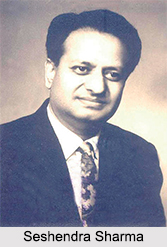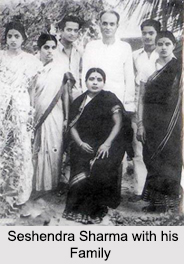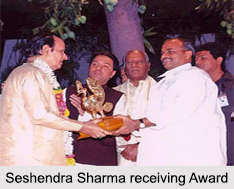 Seshendra Sharma, better known as "Seshendra" was a Telugu poet, critic and litterateur. He was a colossus of Modern Indian poetry. His literature is a unique blend of the best of poetry and poetics. Seshendra Sharma is well known for his works "Naa Desam, Naa Prajalu" and "Kaala Rekha". His scholarship and command over Sanskrit, English and Telugu languages has facilitated his emergence as a huge personality of comparative literature in the 20th Century. He has authored over 50 works which have been translated into English, Kannada, Urdu, Bengali, Hindi, Nepali and Greek languages.
Seshendra Sharma, better known as "Seshendra" was a Telugu poet, critic and litterateur. He was a colossus of Modern Indian poetry. His literature is a unique blend of the best of poetry and poetics. Seshendra Sharma is well known for his works "Naa Desam, Naa Prajalu" and "Kaala Rekha". His scholarship and command over Sanskrit, English and Telugu languages has facilitated his emergence as a huge personality of comparative literature in the 20th Century. He has authored over 50 works which have been translated into English, Kannada, Urdu, Bengali, Hindi, Nepali and Greek languages.
Early Life of Seshendra Sharma
Seshendra Sharma was born on 20 October 1927 to his parents, G. Subrahmanyam Sharma and Ammaayamma. He spent his childhood in his ancestral home in Totapalli Guduru, Nellore District of Andhra Pradesh. He had three siblings; two younger sisters Anasuya (died in 2007) and Devasena and a younger brother Rajasekhar (died in 2003).
Seshendra Sharma graduated with a B.A. in Literature from Andhra Christian College affiliated under Andhra University. He also obtained his Law degree from the Madras University. In 1949, he worked as Deputy Municipal Commissioner in the State Government of Andhra Pradesh for 37 years. He retired as the Municipal Commissioner of Hyderabad.
 Works of Seshendra Sharma
Works of Seshendra Sharma
Seshendra Sharma"s first work in print appeared in 1952 which was a translation of Matthew Arnold"s "Sohrab and Rustum". In the beginning, he focused mainly on poetry and occasionally worked on literary criticism. His first collection of prose-poems was entitled "Sesha Jyotsna" which was published in 1972 in Telugu and English. It was also translated into Hindi and Urdu separately.
Seshendra Sharma got prominence as one of the outstanding poets of India with his magnum opus "Naa Desam, Naa Prajalu" (My Country, My People). This led him to his nomination for the Nobel Prize in Literature in 2004. He was the second person to have been nominated for the Nobel Literature Prize for his exceptional contribution to literary field from India, only after Rabindranath Tagore.
 Seshendra Sharma"s works of literary criticism are "Shodasi", tantric commentaries on Ramayana, and "Swarna Hamsa", the study of Harsha Naishadhiya Charita. In 1994, "Kaala Rekha" is a collection of 25 essays on various subjects like Ancient Sanskrit Drama and Ancient Greek Drama, Comparative Literature, Classical Poetry and Aurobindo"s Savitri. In 1976, "Neerai Paaripoyindi" (Melted Away) is a collection of poems which was published in bilingual editions. Diversity and depth of his literary interests and his works are perhaps hitherto unknown in Indian literature.
Seshendra Sharma"s works of literary criticism are "Shodasi", tantric commentaries on Ramayana, and "Swarna Hamsa", the study of Harsha Naishadhiya Charita. In 1994, "Kaala Rekha" is a collection of 25 essays on various subjects like Ancient Sanskrit Drama and Ancient Greek Drama, Comparative Literature, Classical Poetry and Aurobindo"s Savitri. In 1976, "Neerai Paaripoyindi" (Melted Away) is a collection of poems which was published in bilingual editions. Diversity and depth of his literary interests and his works are perhaps hitherto unknown in Indian literature.
Poems by Seshendra Sharma
A poem written by Seshendra Sharma is given below:
Rivers and poets
Are veins and arteries
Of a country.
Rivers flow like poems
For animals, for birds
And for human beings-
The dreams that rivers dream
Bear fruit in the fields
The dreams that poets dream
Bear fruit in the people-
Another poem written by Seshendra Sharma is as follows:
•The sunshine of my thought fell on the word
•And its long shadow fell upon the century
•Sun was playing with the early morning flowers
•Time was frightened at the sight of the martyr.
Achievements of Seshendra Sharma
The following are the awards and accolades received by Seshendra Sharma for his immense contribution to Telugu Literature:
•"Sahitya Akademi Award" for his work "Kaala Rekha" in 1994.
•"Central Sahitya Akademi" fellowship in 1999.
•"Sahitya Ratna" by Sri Ram Sahitya Mandal, Himachal Pradesh in 2001.
•"Hamsa Award" by Andhra Pradesh State Government in 2004.
•Rashtrendu" (Moon of the Nation) by West Bengal State Government.
•"Kalidas Samman" by Madhya Pradesh State Government.
•"Subrahmanya Ekta Award" by Hindi Academy.
•"Rashtriya Sanskriti Puraskar".
•"Ugadi Puraskar".
•"Lokmanya Tilak Award".
Personal Life of Seshendra Sharma
Seshendra Sharma was married to Janaki. The couple had two girls and two boys; Vasundhara, Revathi, Vanamaali and Saatyaki. Later in 1970, he entered in a romantic relationship with Indira Devi Dhanrajgir, an Indo-Anglican poet.
Death of Seshendra Sharma
Seshendra Sharma died on 30 May 2007. He lived with Indira Devi Dhanrajgir at her Gyanbagh Palace till his death.













